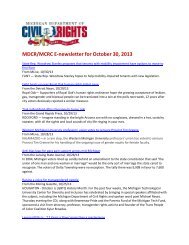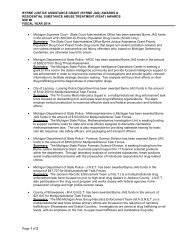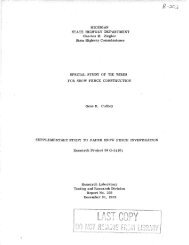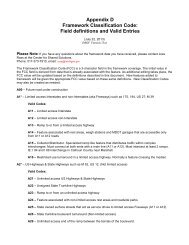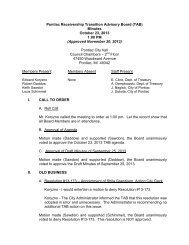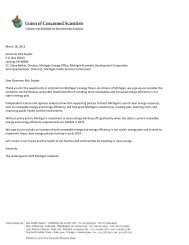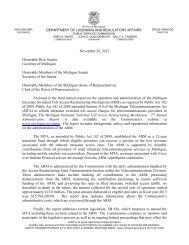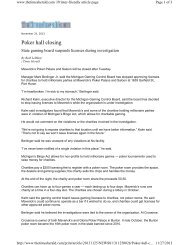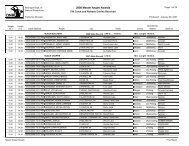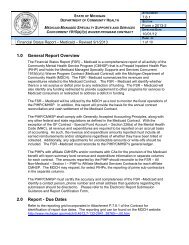- Page 1:
MICHIGAN HYPERTENSION CORE CURRICUL
- Page 4 and 5:
April 2010 Dear Colleague: In 2005,
- Page 6 and 7:
Kevin L. Piggott, MD, MPH, FAAFP Pr
- Page 8 and 9:
Blood Pressure Measurement........
- Page 10 and 11:
10 Hypertension Core Curriculum Blo
- Page 12 and 13:
of the wrist. Additionally, there i
- Page 14 and 15:
asis. National guidelines recommend
- Page 16 and 17:
Post-Test Questions: 1. High BP is
- Page 18 and 19:
18 Hypertension Core Curriculum Ess
- Page 20 and 21:
Masked Hypertension is when the off
- Page 22 and 23:
TABLE 1. Prevalence of Awareness, T
- Page 24 and 25:
Blood Pressure, Circulatory Physiol
- Page 26 and 27:
side of the vascular tree. Arterial
- Page 28 and 29:
upon the other co-morbidities prese
- Page 30 and 31:
Table 3. Clinically Available Clues
- Page 32 and 33:
In the setting of chronic hypertens
- Page 34 and 35:
34 Hypertension Core Curriculum Tab
- Page 36 and 37:
cause greater disruption of CBF aut
- Page 38 and 39:
References/Suggested Reading Agabit
- Page 40 and 41:
40 Hypertension Core Curriculum Chr
- Page 42 and 43:
development of essential HTN can se
- Page 44 and 45:
Figures: Figure 1. Pie-chart with m
- Page 46 and 47:
Table 2 Table 3 Screening Test for
- Page 48 and 49:
References: 1. U.S. Renal Data Syst
- Page 50 and 51:
50 Hypertension Core Curriculum Spe
- Page 52 and 53:
side effects particularly well. A h
- Page 54 and 55:
14. Gaede P, Vedel P, Larsen N, Jen
- Page 56 and 57:
Learning Objectives: 56 Hypertensio
- Page 58 and 59:
glycemic risk factdors such as hype
- Page 60 and 61:
. Weight loss c. Weight gain d. A a
- Page 62 and 63:
References: 1. Association AD. All
- Page 64 and 65:
64 Hypertension Core Curriculum Spe
- Page 66 and 67:
foods and turn out of necessity to
- Page 68 and 69:
Figure 1: Table 1. Metabolic Syndro
- Page 70 and 71:
9. Singh GK, Kogan MD, Van Dyck PC,
- Page 72 and 73:
Incidence and Prevalence The overal
- Page 74 and 75:
access to healthy foods than their
- Page 76 and 77:
As a part of the approach to managi
- Page 78 and 79:
B Hypertensive Adults (rate, percen
- Page 80 and 81:
References: 1. Lewington S, Clarke
- Page 82 and 83:
82 Hypertension Core Curriculum
- Page 84 and 85:
appear to be related to access to c
- Page 86 and 87:
CDC MMWR Feb 24, 2006/55(07); 177-1
- Page 88 and 89:
Figure 1; Clinical presentation and
- Page 90 and 91:
90 Hypertension Core Curriculum Phe
- Page 92 and 93:
ANY patient, who develops paroxysma
- Page 94 and 95:
Figure 1: 94 Hypertension Core Curr
- Page 96 and 97:
Objectives: 96 Hypertension Core Cu
- Page 98 and 99:
Definition Prevalence Clinical Feat
- Page 100 and 101:
intake. 4 Figure 1; Ion transport i
- Page 102 and 103:
loading with 200 mmoles (4.6 grams)
- Page 104 and 105:
Figure 3; Endocrine Society See tex
- Page 106 and 107:
INTRODUCTION 106 Hypertension Core
- Page 108 and 109:
Renal manifestations. Renal ischemi
- Page 110 and 111:
to assess renal dimensions and dupl
- Page 112 and 113:
stenosis severity. Patients with no
- Page 114 and 115:
ARAS, ischemic nephropathy, and imp
- Page 116 and 117:
the goals of minimizing injury to t
- Page 118 and 119:
hemodynamically impaired renal arte
- Page 120 and 121:
e classified as having “renovascu
- Page 122 and 123:
disease of the abdominal aorta and
- Page 124 and 125:
Table 1. Contemporary evaluation of
- Page 126 and 127:
2. Screening tests for RAS RDU, MRA
- Page 128 and 129:
Manifestations of vital organ injur
- Page 130 and 131:
Table 6. Clinical evaluation of ren
- Page 132 and 133: Table 9. Assessment of worsening re
- Page 134 and 135: Table 11. New terminology for renal
- Page 136 and 137: References: 1. Murphy TP, Soares G,
- Page 138 and 139: 2001;12(6):1235-1241. 40. Subramani
- Page 140 and 141: 78. Tami LF, McElderry MW, al-Adli
- Page 142 and 143: 142 Hypertension Core Curriculum Pr
- Page 144 and 145: monitored hypertension screening an
- Page 146 and 147: Policy Development: Public health p
- Page 148 and 149: Med Clin North Am. Jan 2004;88(1):2
- Page 150 and 151: mind they will have no problem iden
- Page 152 and 153: Role of Race in the Selection of An
- Page 154 and 155: individuals of any race or ethnicit
- Page 156 and 157: Older Patients Need Elevated Systol
- Page 158 and 159: sister, mother and father. A family
- Page 160 and 161: ecause pressure-related retinopathy
- Page 162 and 163: pulses (lower in the left arm). 4 C
- Page 164 and 165: Vital signs suggestive of OSAHS. 20
- Page 166 and 167: may shed light on underlying medica
- Page 168 and 169: References: patients. 8 However, th
- Page 170 and 171: Objectives: 170 Hypertension Core C
- Page 172 and 173: and evidence that anti-hypertensive
- Page 174 and 175: When subjects are given instruction
- Page 176 and 177: interestingly found only a 6.0/4.6
- Page 178 and 179: pressure: a meta-analysis of random
- Page 180 and 181: isolated systolic hypertension have
- Page 184 and 185: 3.) Beta-blockers, ACE inhibitors,
- Page 186 and 187: treatment levels - albeit though at
- Page 188 and 189: Preparations and Dosage: Oral antih
- Page 190 and 191: Preparations and Dosages: The Oral
- Page 192 and 193: patients with tachy-brady syndrome
- Page 194 and 195: significant proteinuria. Pharmacolo
- Page 196 and 197: the effect found by the ACE inhibit
- Page 198 and 199: and nominally statistically signifi
- Page 200 and 201: sensitive K+-channels in vascular s
- Page 202 and 203: clonidine (Catapres†) 0.1-0.8 mg
- Page 204 and 205: Learning Objectives 204 Hypertensio
- Page 206 and 207: general, the response to beta-block
- Page 208 and 209: Table 2: (JNC VII, 2004) 208 Hypert
- Page 210 and 211: Learning objectives: 210 Hypertensi
- Page 212 and 213: ecently published RCT investigated
- Page 214 and 215: Post-test question: 35y/o male w/ h
- Page 216 and 217: Orthostatic Hypotension Pretest que
- Page 218 and 219: BP. It is important to note that la
- Page 220 and 221: 1- Fludrocortisone : a mineralocort
- Page 222 and 223: References: 1. Hiitola P, Enlund H,
- Page 224 and 225: www.neuroanatomy.wisc.edu/.../Image
- Page 226 and 227: Learning objectives: 226 Hypertensi
- Page 228 and 229: controlled BP to have been victimiz
- Page 230 and 231: Treatment of Secondary Causes of Hy
- Page 232 and 233:
4-Direct vasodilators (e.g.minoxidi
- Page 234 and 235:
Hypertension. Aug 2003;42(2):161-16
- Page 236 and 237:
emergency by virtue of the associat
- Page 238 and 239:
PATHOPHYSIOLOGY The underlying mech
- Page 240 and 241:
trials included a placebo arm. Seve
- Page 242 and 243:
an indication for careful and modes
- Page 244 and 245:
ACUTE KIDNEY INJURY (AKI) In additi
- Page 246 and 247:
Blood Pressure Research Council, an
- Page 248 and 249:
[ACE inhibitors (ACEIs), angiotensi
- Page 250 and 251:
y sodium restriction or the use of
- Page 252 and 253:
44 months 24 , and were also seen i
- Page 254 and 255:
• Hypertension in dialysis patien
- Page 256 and 257:
GISEN Group (Gruppo Italiano di Stu
- Page 258 and 259:
258 Hypertension Core Curriculum
- Page 260 and 261:
DEFINITION AND CLASSIFICATION Hyper
- Page 262 and 263:
etween adult socioeconomic position
- Page 264 and 265:
women treated with atenolol in earl
- Page 266 and 267:
Obstet Gynecol. Dec 12 2008. 5. Vol
- Page 268 and 269:
able to dissipate the pressure rise
- Page 270 and 271:
Use of Dihydropyridine Calcium Anta
- Page 272 and 273:
272 Hypertension Core Curriculum Ca
- Page 274 and 275:
Case 4 Hypertensive patient with CK
- Page 276 and 277:
Case 6 276 Hypertension Core Curric
- Page 278 and 279:
year. Sodium restriction and weight
- Page 280:
What may be causing these new sympt




